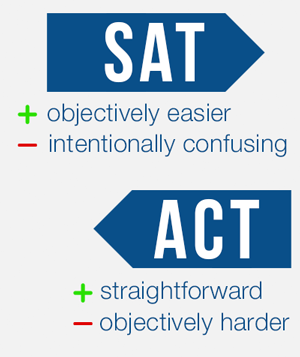— The Differences —
Between the SAT and the ACT
I’m going to skip the random differences in formatting, number of questions, number of sections, etc., and get right to what really matters:
Note: If you’re planning on taking either test after March of 2016, the differences that you’re reading about here will no longer apply thanks to the launch of the New SAT, which will first be offered in March of 2016. For a detailed guide on what’s changing and how to approach the new test, read my Guide to the New SAT.
1
The SAT and the ACT test almost identical material – with a few key exceptions.
Both tests have essays. Both tests have math sections. Both tests have reading comprehension sections. Both tests have “grammar” sections. And, for the most part, the material tested by these sections is practically identical.
Learning the material for one exam will help you perform on the other. But there are a few exceptions.
A) The SAT emphasizes vocabulary far more than the ACT does.

A strong vocabulary will help students on the reading portions of both exams. But if you have a very weak vocabulary, the SAT will present more of a challenge than the ACT will. Conversely, students with strong vocabularies will have a massive leg-up on the SAT.
B) The ACT tests slightly more complex, more advanced math.

Roughly 9 out of the 60 problems on the ACT math section have to do with mathematical concepts that are not covered on the SAT, including trigonometry, imaginary numbers, advanced geometric shapes, logarithms, and more.
If you haven’t learned these concepts in school, the ACT will present small additional challenges in the math section. Please note: this does NOT mean that you should wait until you’ve covered these topics in school before you begin to prep. None of these concepts are particularly hard to learn, and can be picked up in minutes with the right guidance – schools just take a long time to teach them because they rely on a classroom learning model.
If you don’t view yourself as a “strong math student,” the ACT will probably be a bit harder on a material basis. If you’re advanced in math, and have a strong grasp on the more advanced topics, the ACT’s material will be much easier than the somewhat “trickier” material on the SAT.
C) The SAT and ACT require identical grammatical and writing skills for the English / Writing sections, and for the essays
Not a single fact or concept is different on one test than on the other.
D) The ACT has a “science” section that has nothing – I repeat, NOTHING – to do with science.

The ACT “science” section could more accurately be named the “using information in graphs and charts properly” section. It requires zero knowledge of chemistry, biology, physics, geology, etc. The ACT science section does require strategy, but the material on this section has nothing to do with science.
Example: an ACT science question might ask, “if birds had mass extinction events in 1234, 1754, and 1910, what might graph 3 suggest about the main cause of extinction for birds?”
Looking at graph 3, you’ll see that there were massive increases in methane during the years 1230, 1750, and 1906. One of the answer choices will be, “birds die from high methane concentrations in the air.”
This isn’t scientific knowledge – this is just common sense. But this section does take some getting used to. You need to figure out how to quickly and accurately decipher the graphs and charts presented. Again, however, I can’t state this enough – you don’t need to know any actual science to get a perfect ACT science score.
If the material is so similar, than what IS the difference between these tests?
Just because they test similar concepts does not mean that they’re similar exams. The difference between these two tests comes down to one key concept:
2
The SAT is intentionally confusing, but objectively easier, whereas the ACT is incredibly straightforward, but objectively harder.

Let me use an example to illustrate my point. On the ACT, you might be asked a question like this:
The sequence 4, 7, 9, 12, 4, 7, 9, 12…. repeats indefinitely. What is the 8,905,432nd number in the sequence?
A tough problem, to be sure, but very straightforward. Here’s how the SAT would ask the same type of question:
A man at a factory is tasked with capping jars in the following order: blue, yellow, green, and red. He must always maintain this order of colored caps in a sequence. After his lunch break, he puts a green cap on a jar. It is the first cap he applies. This being the case, which of the following jar numbers could have a blue cap?
To solve both problems, you need a simple understanding of sequential logic. But while the ACT problem is pure and straightforward, the SAT problem is masked in a haze of logical reasoning concepts, anecdotal wording, and its own “language.”
The ACT will present you with a set of tri-variate equations, line them up next to each other, and say: “solve for X.” The SAT will present you with some bizarre tale about how much money Joe has compared to Max compared to Tim, then ask you to find out how much money Max has. You need to figure out the equations on your own. The resulting equations will be easier than the ones on the ACT, but only if you can figure them out in the first place.
The same goes for SAT critical reading and writing vs. ACT reading and English. The ACT will ask:
“What was Jane trying to accomplish by talking to her uncle?”
The SAT will ask,
“If the author of passage 1 read lines 45-47 of passage 2, which of the following is he least likely to offer as a response?”
The SAT passages will be simpler, and the point will be obvious, but only if you can keep the question straight in your head.
In general, students who perform well on logical reasoning exams and puzzles do well on the SAT, and are very “teachable.” Students who prefer straightforward information and plow through their academic subjects with straight As do better on the ACT.
The SAT gives students plenty of time to decipher problems, and rewards them for creative thinking. The ACT is a brutal, straightforward exam of material and concepts. Most people will have a pretty good idea of which test they’ll prefer based purely on this description.
But there’s another key difference between the exams that needs to be understood:
3
The ACT is ludicrously time-rigorous.

The SAT offers three math sections, and if you run out of time on one and miss a few questions, it’s not the end of the world. If you run out of time on the ACT math section…sorry.
Time management is important on the SAT – it is EVERYTHING on the ACT.
I spend about 10% of my focus with my SAT students on time management techniques. I spend about 70% of my time with ACT students on time management techniques. The ACT is a test of timing. You need to fly through. You have less time per question, and the you need to simply “pound it out.”
Almost half a student’s success on the ACT math section boils down to understanding which questions to skip. You have 60 minutes for 60 questions, all at once, and if you accidentally spend 6 minutes on question #17…kiss your score goodbye. That’s at least 5 questions you won’t get to answer.
I could write a book on this subject (and I’ve written a free ACT crash course that you can check out at any time), so I’ll come to my conclusion early:
If you don’t need extra time, are focused, and have “sitting power” – the ability to plow through material without distraction – you have a HUGE advantage on the ACT. If you’re easily distracted, have problems managing time, or get overwhelmed by pressure and need frequent breaks, you should avoid the ACT AT ALL COSTS.
Again, you know yourself much better than I do. Can you sit down with 4 hours’ worth of homework, emerge 4 hours later, and be finished? That’s a somewhat rare ability, but if you have it – you will crush the ACT. If you have ADD, or need lots of breaks, or have trouble managing your time – the ACT will be extremely difficult.
Thus far, all this information has been a bit “anecdotal.” Let’s get down to brass tacks: which test should you take? Fortunately, the answer is remarkably simple to figure out. The process is outlined on page four of this guide.


